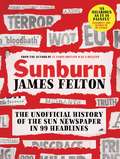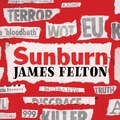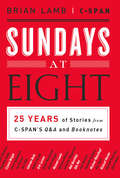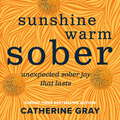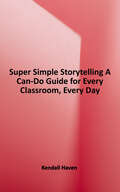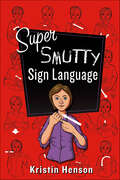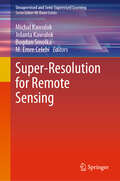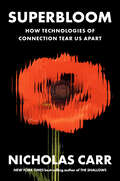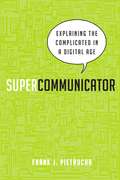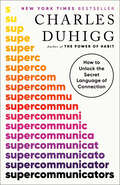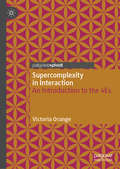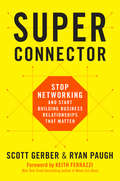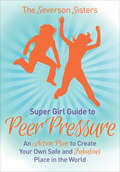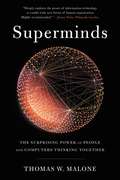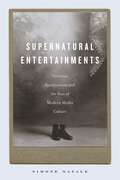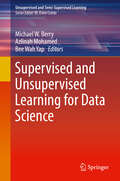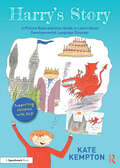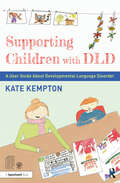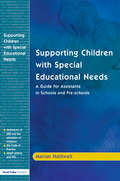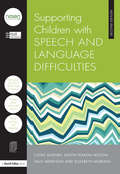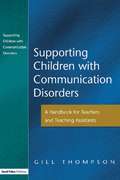- Table View
- List View
Sunburn: The unofficial history of the Sun newspaper in 99 headlines
by James Felton'An astonishing piece of work' James O'Brien'This book was a delight. Funny, scathing and witty' Ian Dunt You should buy this book if: a) you dislike the Sun, but have never actually read it to know why and/or b) you're still not sure how we got into this mess. Using his famed on-the-nose commentary, Twitter legend James Felton has dissected 99 of the most outlandish stories the Sun (for a long time the biggest-selling British newspaper) has run since it became a tabloid in 1969, hoping to answer once and for all whether the press has reflected - or manipulated - the British people over the last 50 years. Included: joke-riddled and illustrated analyses of the Sun's most infamous stories about celebrities, war, royals, crime, the LGBTQ+ community, migrants, the EU, politics, bacon sandwiches and page 3.Not included: A blindfold. We suggest reading through your fingers instead. 'James Felton makes me laugh like a bellend' Robert Webb'James Felton makes me laugh every day' Marina Hyde'James never fails to make me laugh and then think, then laugh some more' Dermot O'Leary
Sunburn: The unofficial history of the Sun newspaper in 99 headlines
by James Felton'An astonishing piece of work' James O'Brien'This book was a delight. Funny, scathing and witty' Ian Dunt You should buy this book if: a) you dislike the Sun, but have never actually read it to know why and/or b) you're still not sure how we got into this mess.Using his famed on-the-nose commentary, Twitter legend James Felton has dissected 99 of the most outlandish stories the Sun (for a long time the biggest-selling British newspaper) has run since it became a tabloid in 1969, hoping to answer once and for all whether the press has reflected - or manipulated - the British people over the last 50 years. Included: joke-riddled and illustrated analyses of the Sun's most infamous stories about celebrities, war, royals, crime, the LGBTQ+ community, migrants, the EU, politics, bacon sandwiches and page 3.Not included: A blindfold. We suggest reading through your fingers instead. 'James Felton makes me laugh like a bellend' Robert Webb'James Felton makes me laugh every day' Marina Hyde'James never fails to make me laugh and then think, then laugh some more' Dermot O'Leary
Sunburn: The unofficial history of the Sun newspaper in 99 headlines
by James FeltonJAMES FELTON'S "ASSHOLES" IS OUT NOW 'An astonishing piece of work' James O'Brien'This book was a delight. Funny, scathing and witty' Ian Dunt You should buy this book if: a) you dislike the Sun, but have never actually read it to know why and/or b) you're still not sure how we got into this mess. Using his famed on-the-nose commentary, Twitter legend James Felton has dissected 99 of the most outlandish stories the Sun (for a long time the biggest-selling British newspaper) has run since it became a tabloid in 1969, hoping to answer once and for all whether the press has reflected - or manipulated - the British people over the last 50 years. Included: joke-riddled and illustrated analyses of the Sun's most infamous stories about celebrities, war, royals, crime, the LGBTQ+ community, migrants, the EU, politics, bacon sandwiches and page 3.Not included: A blindfold. We suggest reading through your fingers instead. 'James Felton makes me laugh like a bellend' Robert Webb'James Felton makes me laugh every day' Marina Hyde'James never fails to make me laugh and then think, then laugh some more' Dermot O'Leary
Sundays at Eight: 25 Years of Stories from C-SPAN'S Q&A and Booknotes
by Brian Lamb C-SpanFor the last 25 years, Sunday nights at 8pm on C-SPAN has been appointment television for many Americans. During that time, host Brian Lamb has invited people to his Capitol Hill studio for hour-long conversations about contemporary society and history. In today's soundbite culture that hour remains one of television's last vestiges of in-depth, civil conversation.First came C-SPAN's Booknotes in 1989, which by the time it ended in December 2004, was the longest-running author-interview program in American broadcast history. Many of the most notable nonfiction authors of its era were featured over the course of 800 episodes, and the conversations became a defining hour for the network and for nonfiction writers.In January 2005, C-SPAN embarked on a new chapter with the launch of Q and A. Again one hour of uninterrupted conversation but the focus was expanded to include documentary film makers, entrepreneurs, social workers, political leaders and just about anyone with a story to tell.To mark this anniversary Lamb and his team at C-SPAN have assembled Sundays at Eight, a collection of the best unpublished interviews and stories from the last 25 years. Featured in this collection are historians like David McCullough, Ron Chernow and Robert Caro, reporters including April Witt, John Burns and Michael Weisskopf, and numerous others, including Christopher Hitchens, Brit Hume and Kenneth Feinberg.In a March 2001 Booknotes interview 60 Minutes creator Don Hewitt described the show's success this way: "All you have to do is tell me a story." This collection attests to the success of that principle, which has guided Lamb for decades. And his guests have not disappointed, from the dramatic escape of a lifelong resident of a North Korean prison camp, to the heavy price paid by one successful West Virginia businessman when he won $314 million in the lottery, or the heroic stories of recovery from the most horrific injuries in modern-day warfare. Told in the series' signature conversational manner, these stories come to life again on the page. Sundays at Eight is not merely a token for fans of C-SPAN's interview programs, but a collection of significant stories that have helped us understand the world for a quarter-century.
Sunshine Warm Sober: The unexpected joy of being sober – forever (The Unexpected Joy #5)
by Catherine Gray'Stone cold sober.'Sounds horrible, doesn't it? Hard, icy. Brrrrr. No bloody ta.However, as the millions who choose to stay sober now know, the propaganda around drinking and sobriety is wonky. Sober doesn't feel stony, or cold.Retired wreckhead Catherine Gray, author of surprise bestseller The Unexpected Joy of Being Sober, is now in her ninth sober year and has learnt a damn sight more.This hotly anticipated sequel enlists the help of experts and case studies, turning a curious, playful gaze onto provocative questions. Is alcohol a parenting aid? Why are booze and cocaine such a horse and carriage? Once an addict, always an addict? How do you feel safe - from alcohol, others and yourself - in sobriety?Whether you're a dedicated boozehound, flirting with teetotalling, or already sober, this witty, gritty read may just change how you think about alcohol forever. Praise for The Unexpected Joy of Being Sober:'Fascinating' - Bryony Gordon'Truthful, modern and real' - Stylist'Brave, witty and brilliantly written' - Marie Claire'Gray's tale of going sober is uplifting and inspiring' - The Evening Standard'Not remotely preachy' - The Times'Jaunty, shrewd and convincing' - The Telegraph'Admirably honest, light, bubbly and remarkably rarely annoying' - The Guardian'An empathetic, warm and hilarious tale from a hugely likeable human' - The Lancet Psychiatry(p) 2021 Octopus Publishing Group
Super Simple Storytelling: A Can-Do Guide for Every Classroom, Every Day
by Kendall HavenDesigned for educators and other professionals who want to improve communication skills and boost learning, these simple storytelling techniques are as fun as they are effective. Haven's breakthrough approach helps you build on your natural storytelling abilities to refine your communication skills in the classroom, library, and even at home. This book has everything you need to get started, including detailed directions and guides for more than 40 powerful storytelling exercises to use with your class. You'll find the Golden List of what an audience needs from storytelling, a proven, step-by-step system for successfully learning and remembering a story, the Great-Amazing-Never-Fail Safety Net to prevent storytelling disasters, a comprehensive discussion of the proven value of storytelling in education, and more. The book also shows you how to effectively use storytelling across the curriculum to capture student interest and boost learning.
Super Smutty Sign Language
by Kristin HensonLearn more than 200 dirty, explicit, and downright disgusting ASL words and phrases in this book from the creator of YouTube’s Dirty Signs with Kristin.There are plenty of books and Websites that teach you basic sign language phrases like “Hello,” “Thank you,” and “I love you.” Some even dip into crass vocabulary with “asshole,” or “bite me,” but Super Smutty Sign Language is the only book that delivers truly obscene and offensive insults, sex terms, and pop culture phrases including “Suck a bag of dicks,” “Bitch, please!” “You motorboating son of a bitch!” and “Blumpkin”. Whether you want to tell someone off or pick someone up, Super Smutty Sign Language gives you a comprehensive crash course in getting foul in ASL. Now you can say:- Cum dumpster- I lost my virginity, can I have yours?- There’s a party in my pants, and you’re invited- Gargle my balls- You cum-guzzling ass-pirate!- Let’s play leap-frog naked!-And more!
Super-Resolution for Remote Sensing (Unsupervised and Semi-Supervised Learning)
by M. Emre Celebi Michal Kawulok Bogdan Smolka Jolanta KawulokThis book provides a comprehensive perspective over the landscape of super-resolution techniques developed for and applied to remotely-sensed images. The chapters tackle the most important problems that professionals face when dealing with super-resolution in the context of remote sensing. These are: evaluation procedures to assess the super-resolution quality; benchmark datasets (simulated and real-life); super-resolution for specific data modalities (e.g., panchromatic, multispectral, and hyperspectral images); single-image super-resolution, including generative adversarial networks; multi-image fusion (temporal and/or spectral); real-world super-resolution; and task-driven super-resolution. The book presents the results of several recent surveys on super-resolution specifically for the remote sensing community.
Superbloom: How Technologies of Connection Tear Us Apart
by Nicholas CarrOne of Literary Hub's Most Anticipated Books of 2025 From the author of The Shallows, a bracing exploration of how social media has warped our sense of self and society. From the telegraph and telephone in the 1800s to the internet and social media in our own day, the public has welcomed new communication systems. Whenever people gain more power to share information, the assumption goes, society prospers. Superbloom tells a startlingly different story. As communication becomes more mechanized and efficient, it breeds confusion more than understanding, strife more than harmony. Media technologies all too often bring out the worst in us. A celebrated commentator on the human consequences of technology, Nicholas Carr reorients the conversation around modern communication, challenging some of our most cherished beliefs about self-expression, free speech, and media democratization. He reveals how messaging apps strip nuance from conversation, how “digital crowding” erodes empathy and triggers aggression, how online political debates narrow our minds and distort our perceptions, and how advances in AI are further blurring the already hazy line between fantasy and reality. Even as Carr shows how tech companies and their tools of connection have failed us, he forces us to confront inconvenient truths about our own nature. The human psyche, it turns out, is profoundly ill-suited to the “superbloom” of information that technology has unleashed. With rich psychological insights and vivid examples drawn from history and science, Superbloom provides both a panoramic view of how media shapes society and an intimate examination of the fate of the self in a time of radical dislocation. It may be too late to change the system, Carr counsels, but it’s not too late to change ourselves.
Supercommunicator: Explaining the Complicated So Anyone Can Understand
by Frank J. PietruchaIn our increasingly complicated and data-driven world, many new developments are so complex that only experts comprehend their nuances. But what they don't grasp is how to tell the world about them. Communicating technical content to nontechnical listeners has fast become a critical 21st-century skill. Explaining what you do and why it's important drives funding, policy decisions, media exposure, public awareness, and customer adoption. This groundbreaking guide will help anyone to deliver clear, persuasive messages that win hearts, minds, and budgets. Supercommunicator explains how to: Distill details and data into big ideas Deliver meaning to audiences Use storytelling to captivate and educate Humanize content to make complicated ideas more tangible Layer harder ideas on top of easier ideas Strip away complex language, jargon, and acronyms Use analogies to explain unfamiliar areas Master new digital modes of expression And more Enhanced with a wealth of examples--from how the National Academy of Sciences used audience research to improve the way evolution is taught, to how NASA incorporated cutting-edge tools to visualize issues in climatology--this one-of-a-kind book reveals how to make the complex comprehensible, and the dry deeply compelling.
Supercommunicators: How to Unlock the Secret Language of Connection
by Charles DuhiggFrom the Globe and Mail and New York Times bestselling author of The Power of Habit, an investigation of what makes conversations work, and how we can all learn to be supercommunicators at work and in our lives.We all know people who seem capable of connecting with almost anyone. They are the ones we turn to for advice, the ones who ask deep questions but who also seem to hear what we are trying to say. What do they know about conversation that makes them so special? And what can they tell us about how communication really works?Supercommunicators, Charles Duhigg argues, understand—some by intuition, some by hard-won experience—that there is a science to how human beings connect through words. They understand that whenever we speak, we're actually participating in three distinct conversations: What is this really about? How do we feel? And who are we? They know the importance of recognizing—and then matching—each kind of conversation, and how to hear the complex emotions, subtle negotiations and hidden beliefs that color and inform everything we say. Our pasts, our values, our affiliations—our identities—shape every discussion we have, from who will pick up the kids to how we want to be treated at work.With his trademark insight and clarity, Duhigg shows readers how to recognize these three conversations—and teaches us the skills we need to navigate them more successfully. Communication, he argues, is a superpower. By bringing readers into jury deliberations and fraught CIA recruitments, into Netflix's company-wide conversations about equity and the writers' room of The Big Bang Theory, we learn why some people are able to make themselves heard—and to hear others—so clearly. We learn how to recognize and leverage the hidden layers that lurk beneath every conversation. In the end, we learn a simple but powerful lesson: We can connect with anyone, as long as we understand how conversations work.
Supercommunicators: How to Unlock the Secret Language of Connection
by Charles DuhiggNEW YORK TIMES BESTSELLER • From the author of The Power of Habit, a fascinating exploration of what makes conversations work—and how we can all learn to be supercommunicators at work and in life&“A winning combination of stories, studies, and guidance that might well transform the worst communicators you know into some of the best.&”—Adam Grant, author of Think Again and Hidden PotentialONE OF NPR&’S BEST BOOKS OF THE YEAR • FINALIST FOR THE SABEW BEST IN BUSINESS BOOK AWARDCome inside a jury room as one juror leads a starkly divided room to consensus. Join a young CIA officer as he recruits a reluctant foreign agent. And sit with an accomplished surgeon as he tries, and fails, to convince yet another cancer patient to opt for the less risky course of treatment. In Supercommunicators, Charles Duhigg blends deep research and his trademark storytelling skills to show how we can all learn to identify and leverage the hidden layers that lurk beneath every conversation.Communication is a superpower and the best communicators understand that whenever we speak, we&’re actually participating in one of three conversations: practical (What&’s this really about?), emotional (How do we feel?), and social (Who are we?). If you don&’t know what kind of conversation you&’re having, you&’re unlikely to connect. Supercommunicators know the importance of recognizing—and then matching—each kind of conversation, and how to hear the complex emotions, subtle negotiations, and deeply held beliefs that color so much of what we say and how we listen. Our experiences, our values, our emotional lives—and how we see ourselves, and others—shape every discussion, from who will pick up the kids to how we want to be treated at work. In this book, you will learn why some people are able to make themselves heard, and to hear others, so clearly.With his storytelling that takes us from the writers&’ room of The Big Bang Theory to the couches of leading marriage counselors, Duhigg shows readers how to recognize these three conversations—and teaches us the tips and skills we need to navigate them more successfully.In the end, he delivers a simple but powerful lesson: With the right tools, we can connect with anyone.
Supercommunicators: How to Unlock the Secret Language of Connection
by Charles DuhiggFrom the Globe and Mail and New York Times bestselling author of The Power of Habit, an investigation of what makes conversations work, and how we can all learn to be supercommunicators at work and in our lives.We all know people who seem capable of connecting with almost anyone. They are the ones we turn to for advice, the ones who ask deep questions but who also seem to hear what we are trying to say. What do they know about conversation that makes them so special? And what can they tell us about how communication really works?Supercommunicators, Charles Duhigg argues, understand—some by intuition, some by hard-won experience—that there is a science to how human beings connect through words. They understand that whenever we speak, we're actually participating in three distinct conversations: What is this really about? How do we feel? And who are we? They know the importance of recognizing—and then matching—each kind of conversation, and how to hear the complex emotions, subtle negotiations and hidden beliefs that color and inform everything we say. Our pasts, our values, our affiliations—our identities—shape every discussion we have, from who will pick up the kids to how we want to be treated at work.With his trademark insight and clarity, Duhigg shows readers how to recognize these three conversations—and teaches us the skills we need to navigate them more successfully. Communication, he argues, is a superpower. By bringing readers into jury deliberations and fraught CIA recruitments, into Netflix's company-wide conversations about equity and the writers' room of The Big Bang Theory, we learn why some people are able to make themselves heard—and to hear others—so clearly. We learn how to recognize and leverage the hidden layers that lurk beneath every conversation. In the end, we learn a simple but powerful lesson: We can connect with anyone, as long as we understand how conversations work.
Supercomplexity in Interaction: An Introduction to the 4Es
by Victoria OrangeThis book aims to explore the supercomplexity of interaction and to suggest ways of teaching about this supercomplexity in various settings, including intercultural communication and language-learning. Using complex systems theory, the author argues that interaction is actually a supercomplex adaptive system which interconnects a number of different complex systems (the 4Es: Expression, Encounter, Education, Emotion) to give it meaning. She then draws on the concept of heartfulness to promote different ways of understanding and teaching the supercomplexity of interaction. This book will be of interest to language educators and students, as well as scholars of intercultural communication.
Superconnector: Stop Networking And Start Building Business Relationships That Matter
by Scott Gerber Ryan PaughAbandon the networking-for-networking's-sake mentality in favor of a more powerful and effective approach to creating and enhancing connections.STOP NETWORKING. Seriously, stop doing it. Now. It is time to ditch the old networking-for networking's-sake mentality in favor of a more powerful and effective approach to creating and enhancing connections. In Superconnector, Scott Gerber and Ryan Paugh reveal a new category of professionals born out of the social media era: highly valuable community-builders who make things happen through their keen understanding and utilization of social capital. Superconnectors understand the power of relationship-building, problem-solve by connecting the dots at high levels, and purposefully cause different worlds and communities to interact with the intention of creating mutual value.How can you become a Superconnector? Gerber and Paugh share instructive anecdotes from a who's who roster of high achievers, revealing how to systematically manage a professional community and maximize its value. Of utmost importance is practicing Habitual Generosity, acting on the knowledge that your greatest returns come when you least expect them, and that by putting others' needs first the good karma will flow back to you tenfold. Gerber and Paugh also explore winning strategies such as The Art of Selectivity, a well-honed ability to define which relationships matter most for you and decide how you will maintain them over time. Full of helpful advice on how to communicate with anyone about anything, Google-proof your reputation, and much more, Superconnector is a must-read for those seeking personal and business success.
Supergirl Guide to Peer Pressure: An Action Plan to Create Your Own Safe and Fabulous Place in the World
by The Severson SistersThe Super Girl Program was created to help girls &“Connect to their Inner Super Girl.&” The program give girls&’ self-esteem enhancing tools, tips on how to develop and maintain healthy relationships with their peers and action plans on gossip, peer pressure and bullying. Peer Pressure is an element of growing up that girls may face and the "Super Girl Guide to Peer Pressure" provides tools and tips to help girls move through that part of life easier. Severson Sisters strives to teach girls the importance of building self-esteem as a fundamental tool that will help develop, enhance and deepen their relationships with other females.
Superminds: The Surprising Power of People and Computers Thinking Together
by Thomas W. MaloneFrom the founding director of the MIT Center for Collective Intelligence comes a fascinating look at the remarkable capacity for intelligence exhibited by groups of people and computers working together. If you're like most people, you probably believe that humans are the most intelligent animals on our planet. But there's another kind of entity that can be far smarter: groups of people. In this groundbreaking book, Thomas Malone, the founding director of the MIT Center for Collective Intelligence, shows how groups of people working together in superminds -- like hierarchies, markets, democracies, and communities -- have been responsible for almost all human achievements in business, government, science, and beyond. And these collectively intelligent human groups are about to get much smarter. Using dozens of striking examples and case studies, Malone shows how computers can help create more intelligent superminds simply by connecting humans to one another in a variety of rich, new ways. And although it will probably happen more gradually than many people expect, artificially intelligent computers will amplify the power of these superminds by doing increasingly complex kinds of thinking. Together, these changes will have far-reaching implications for everything from the way we buy groceries and plan business strategies to how we respond to climate change, and even for democracy itself. By understanding how these collectively intelligent groups work, we can learn how to harness their genius to achieve our human goals. Drawing on cutting-edge science and insights from a remarkable range of disciplines, Superminds articulates a bold -- and utterly fascinating -- picture of the future that will change the ways you work and live, both with other people and with computers.
Supernatural Entertainments: Victorian Spiritualism and the Rise of Modern Media Culture
by Simone NataleIn Supernatural Entertainments, Simone Natale vividly depicts spiritualism’s rise as a religious and cultural phenomenon and explores its strong connection to the growth of the media entertainment industry in the nineteenth century. He frames the spiritualist movement as part of a new commodity culture that changed how public entertainments were produced and consumed.Starting with the story of the Fox sisters, considered the first spiritualist mediums in history, Natale follows the trajectory of spiritualism in Great Britain and the United States from its foundation in 1848 to the beginning of the twentieth century. He demonstrates that spiritualist mediums and leaders adopted many of the promotional strategies and spectacular techniques that were being developed for the broader entertainment industry. Spiritualist mediums were indistinguishable from other professional performers, as they had managers and agents, advertised in the press, and used spectacularism to draw audiences.Addressing the overlap between spiritualism’s explosion and nineteenth-century show business, Natale provides an archaeology of how the supernatural became a powerful force in the media and popular culture of today.
Supervised and Unsupervised Learning for Data Science (Unsupervised and Semi-Supervised Learning)
by Michael W. Berry Bee Wah Yap Azlinah MohamedThis book covers the state of the art in learning algorithms with an inclusion of semi-supervised methods to provide a broad scope of clustering and classification solutions for big data applications. Case studies and best practices are included along with theoretical models of learning for a comprehensive reference to the field. The book is organized into eight chapters that cover the following topics: discretization, feature extraction and selection, classification, clustering, topic modeling, graph analysis and applications. Practitioners and graduate students can use the volume as an important reference for their current and future research and faculty will find the volume useful for assignments in presenting current approaches to unsupervised and semi-supervised learning in graduate-level seminar courses. The book is based on selected, expanded papers from the Fourth International Conference on Soft Computing in Data Science (2018).Includes new advances in clustering and classification using semi-supervised and unsupervised learning;Address new challenges arising in feature extraction and selection using semi-supervised and unsupervised learning;Features applications from healthcare, engineering, and text/social media mining that exploit techniques from semi-supervised and unsupervised learning.
Supporting Children with DLD: A Picture Book and User Guide to Learn About Developmental Language Disorder (Supporting Children with DLD)
by Kate KemptonThis picture book and guidebook set has been developed to help raise awareness of Developmental Language Disorder, and to highlight the impact of DLD from the child’s point of view. Harry’s Story introduces a child who faces daily challenges in school due to his language difficulties. It explores how these challenges are made easier by his teachers’ understanding and support as he finds new ways to communicate. Supporting Children with DLD provides essential information, prompts and suggestions for adults to help understand the experience of children with DLD. It offers supportive strategies and activities to help children express themselves effectively and ask for help when they need it. This resource can be used both directly with the child, to talk about and explore DLD, and also as a training tool with the parents and professionals who support them. With research suggesting an average of two children per classroom are affected by DLD, this is an essential set for parents and professionals looking to understand the condition.
Supporting Children with DLD: A User Guide About Developmental Language Disorder (Supporting Children with DLD)
by Kate KemptonFor effective use, this book should be purchased alongside the illustrated picture book Harry’s Story. Both books can be purchased together as a set, Supporting Children with DLD: A Picture Book and User Guide to Learn About Developmental Language Disorder [978-0-367-70920-4]. Supporting Children with DLD, has been developed to help raise awareness of Developmental Language Disorder, and to highlight the impact of the condition from the child’s point of view. With activities, prompts and sample questions, this is an essential resource to enable adults to understand the reality of living with DLD, helping children feel heard and respected, as well as providing a solid foundation for tailoring support to individual needs. Drawing on specific examples from Harry’s Story, the book does not assume any prior knowledge of DLD and is designed to offer the reader accessible information and practical advice, teaching as you go. This book: Highlights the link between spoken and written language, addressing the need to recognise the literary difficulties faced by children with DLD Provides practical activities and worksheets that can be used to help children express themselves and ask for help Offers strategies for supporting children’s understanding of language, based on common situations and experiences explored in Harry’s Story Written to be an accessible introduction to DLD and its effect on children’s lives, this is an essential resource for parents and professionals looking to understand the condition.
Supporting Children with Special Educational Needs: A Guide for Assistants in Schools and Pre-schools
by Marian HalliwellFirst Published in 2004. Routledge is an imprint of Taylor & Francis, an informa company.
Supporting Children with Speech and Language Difficulties (nasen spotlight)
by Hull City CouncilCompletely revised and updated in light of the new SEND 2014 Code of Practice, this new edition describes the different types of difficulties experienced by pupils with speech, language and communication needs. It will help teachers and other professionals to feel more confident by providing expert guidance and practical strategies, and as a professional development tool, will also encourage outstanding practice by suggesting ideas and materials for in-house training sessions. The wide-ranging and accessible chapters explore topics including: Listening skills Phonological awareness Comprehension of language Activities for circle time Working with parents Featuring useful checklists, templates and photocopiable resources, this practical resource contains a wealth of valuable advice and tried-and-tested strategies for identifying children and young people with speech, language and communication needs, ensuring they have the support they need to make exceptional progress.
Supporting Communication Disorders: A Handbook for Teachers and Teaching Assistants
by Gill ThompsonThis practical handbook provides SENCOs, class teachers and teaching assistants with a step-by-step guide to the identification of speech and language disorders, a basic knowledge of the underlying causes and guidance for developing strategies for support and intervention in the classroom. It gives a foundation for assessment and differentiation, which will help the teacher or teaching assistant to work effectively in collaboration with speech and language therapists. It suggests appropriate materials and programmes of work for enabling the child to access the curriculum as fully as possible. The book includes photocopiable assessments and worksheets, which can be used as part of planning and intervention for individual children or small group work.
Supporting Grammar and Language Development in Children: A Guidebook for the Grammar Tales Stories (Grammar Tales)
by Jessica HabibThis guidebook has been created to accompany the Grammar Tales story books, a collection of beautifully illustrated picture books designed to support grammar and language development in children. Including accessible activities and ideas to help children use grammar forms expressively, the guidebook discusses the specific grammatical form focused on in each story, and offers support in using the storybooks effectively. Photocopiable and downloadable handouts for parents and carers allow therapy work to continue beyond the therapy session. This guidebook is an essential accompaniment to the Grammar Tales storybooks for Speech and Language therapists working with children.
